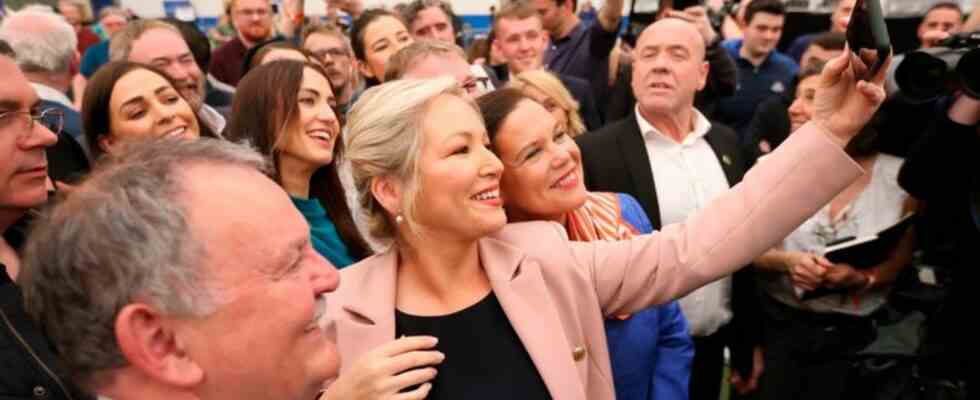Great Britain
Northern Ireland election: Sinn Fein advance heralds a new era
Sinn Fein top candidate Michelle O’Neill (centre) celebrates. Photo: Peter Morrison/AP/dpa
© dpa-infocom GmbH
For the first time in the history of Northern Ireland, the Catholic Republican party Sinn Fein is likely to become the strongest force in Parliament. A first step towards Irish unity?
After counting the majority of the votes in the Northern Ireland regional parliamentary elections, the top candidate of the Catholic-Republican party Sinn Fein has shown herself to be confident of victory.
Amid a flurry of flashbulbs and thunderous applause from her party colleagues, Michelle O’Neill celebrated the announcement of the results in her constituency of Mid Ulster in the town of Magherafelt that afternoon.
“Today is a very momentous day of change,” O’Neill said. She added: “Today begins a new era that gives us all the opportunity to redefine relationships in society on the basis of fairness, equal treatment and social justice regardless of social background.”
protest against the formation of a government
O’Neill called on the other parties to cooperate to form a government. According to the peace agreement of 1998 known as the Good Friday Agreement, the largest parties from both denominational camps must agree to work together in a unity government. However, the largest Protestant Unionist party, the DUP (Democratic Unionist Party), has already announced that it does not want to join a government in protest at Northern Ireland’s special Brexit status.
A final result was expected on Saturday. It is expected that Sinn Fein will win the majority of seats in the Northern Ireland Assembly, giving it the right to nominate the future Prime Minister (First Minister).
The expected Sinn Fein triumph would be a symbolic turning point in the history of the British region that was founded a good 100 years ago. Sinn Fein was once considered the political arm of the IRA (Irish Republican Army), which fought at gunpoint to unite the two parts of Ireland. So far, politicians who advocated maintaining the union with Great Britain have always held this office.
Election campaign focused on social issues
However, the issue of Irish unity played only a minor role in the election campaign. Instead, Sinn Fein focused on social issues such as the rising cost of living and health. O’Neill announced that she wanted to focus primarily on these issues as the future head of government. At the same time, she called for a broad social debate on Irish unity. “Let’s all work on a common plan,” says O’Neill.
However, the DUP demands as a condition that the government in London breaks the agreements with the EU on the province’s special Brexit status. “The Brexit deal and the Good Friday deal are incompatible,” influential Northern Ireland DUP MP Edwin Poots told the BBC on Saturday. Prime Minister Boris Johnson’s government must decide whether to put the agreement with the EU over the peace process in the region, Poots continued.
The DUP had to prepare for serious losses in the election. On the one hand, she is likely to lose votes to the TUV, which is even more radically opposed to the Northern Ireland Protocol, and on the other hand, a number of former DUP voters will probably also do their cross with the Alliance Party this time. The non-denominational party wants to put the dispute between supporters and opponents of Irish unification behind it and is likely to have done well in the election.

